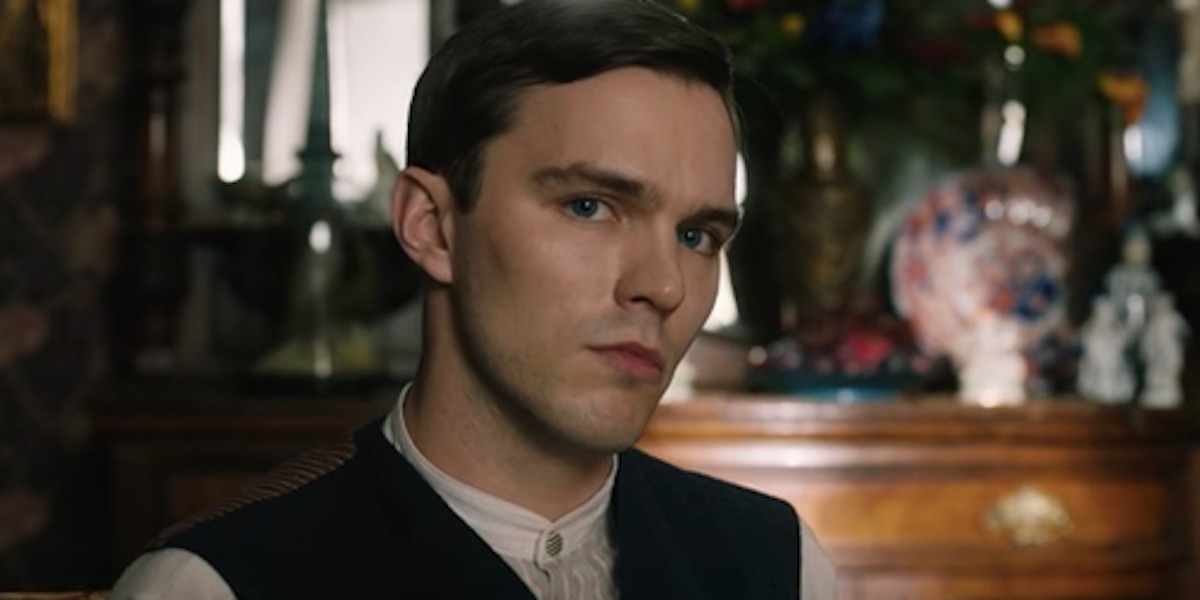New Trailer for Tolkien Leaves Us Wondering How Much the Author Should Be Listened To

Tolkien‘s first official trailer gives us a deeper dive into the author’s world, though the movie is sure to kick up ages-old debate about how much J.R.R. Tolkien’s personal experiences influenced his writing.
Previously, we’d looked at a brief teaser for Tolkien, and I wrote that the images of Tolkien at war intercut with fantasy scenes gave me shivers—which I stand by. But the more I’ve read about Tolkien’s own commentary on his writing, the more I wonder at some of the liberties Tolkien might be taking.
The movie’s quick summary is pretty straightforward in terms of the tale it wants to tell. Tolkien is “about the extraordinary story of love, courage, and fellowship that informed The Lord of the Rings and other Middle-Earth adventures.”
Aside from Tolkien’s love story with wife Edith (played here by Lily Collins), Tolkien appears to focus on his friendship with three young men he met at King Edward’s School, where they formed a “semi-secret society” bent on making art. This group will veer inevitably towards tragedy. “By 1918 all but one of my close friends were dead,” Tolkien wrote in 1966.
TOLKIEN explores the formative years of the orphaned author as he finds friendship, love and artistic inspiration among a group of fellow outcasts at school. This takes him into the outbreak of World War I, which threatens to tear the “fellowship” apart. All of these experiences would inspire Tolkien to write his famous Middle-Earth novels.
As with any fictional film about a person whose fame has caused them to achieve a sort of legendary status, Tolkien is a dramatization of the author’s life. Everyone is movie-star beautiful in gorgeous costumes, walking in perfect lighting and saying witty things. Obviously, this is not a documentary, but a sort of fantasy about J.R.R. Tolkien.
This movie is likely inspired by the main beats of Tolkien’s life, romanticizing them and drawing extrapolations to the content that the audience already knows from Middle-earth books and movies. They’re not exactly going for sleight of hand here, but heavy-handedness: “A fellowship,” one of Tolkien’s friends earnestly declares. Cue poignant orchestral swell, no doubt.
While the shots of Tolkien in World War I are visually striking—seeming to conflate his time on the battlefield directly with the fantastical figures and fights that would populate his novels—this is where we arrive at the biggest factual issue.
The difficulty comes in that while Tolkien’s experiences in wartime certainly informed his writing, the author himself claimed—stridently— that his works were not direct allegories for either World War, and I think that we should listen to him.
Tolkien aficionados in the trailer’s comment section have been quick to point this out. “This looks like they’re going to try to paint his war service as triggers for his writing, when he has denied that many times,” commenter Galactic123 wrote.
Tolkien’s studies in Anglo-Saxon literature and his fascination with Norse mythology and Finnish epics were more crucial to Lord of the Rings’ set pieces and creatures than anything he personally witnessed. Tolkien, who was devoutly religious, also said that his works were fundamentally Catholic, and there are Christian religious themes embedded throughout. It’s unclear how much the movie will be depicting his Catholicism.
“An author cannot of course remain wholly unaffected by his experience, but the ways in which a story-germ uses the soil of experience are extremely complex, and attempts to define the process are at best guesses from evidence that is inadequate and ambiguous. It is also false, though naturally attractive, when the lives of an author and critic have overlapped, to suppose that the movements of thought or the events of times common to both were necessarily the most powerful influences,” Tolkien wrote in his introduction to the second edition of Lord of the Rings in 1966.
In the same piece, on the conflation of Lord of the Rings with World Wars I or II, he said, “As for any inner meaning or ‘message’, it has in the intention of the author none. It is neither allegorical nor topical [… ] I cordially dislike allegory in all its manifestations, and always have done so since I grew old and wary enough to detect its presence. I much prefer history, true or feigned, with its varied applicability to the thought and experience of readers. I think that many confuse ‘applicability’ with ‘allegory’; but the one resides in the freedom of the reader, and the other in the purposed domination of the author.”
It seems a bit odd to frame an entire movie around theories and allegories the central “character” has flatly denied, but we’ll have to wait to see Tolkien to assess how much these correlations are made to be in play.
On a filmmaking level, this looks like a lovely movie that was made with a lot of reverence for the man at its center. I will see it, and I will likely cry. I may love everything about it. Yet how closely it will hew to the truths that Tolkien himself asserted remains to be seen, and it leaves me wondering if movies like Tolkien mean that the author is well and truly dead.
Tolkien stars Nicholas Hoult, Lily Collins, Colm Meaney, Anthony Boyle, Patrick Gibson, Tom Glynn-Carney, Craig Roberts, Laura Donnelly, Genevieve O’Reilly, Pam Ferris and Derek Jacobi. It’s in theatres May 10th, 2019.
Talk to me about Middle-earth and authorial intent in the comments, precious.
(images: Fox Searchlight/screengrab)
Want more stories like this? Become a subscriber and support the site!
—The Mary Sue has a strict comment policy that forbids, but is not limited to, personal insults toward anyone, hate speech, and trolling.—
Have a tip we should know? tips@themarysue.com